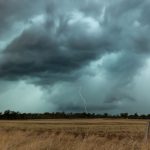 September 7, 2021 12:17 pm
Published by Climate Extremes
September 7, 2021 12:17 pm
Published by Climate Extremes
To better understand the implications of the latest climate science for Tasmania, this brief combines information from the IPCC AR6 WG1 report, with regional assessments that contributed to the UTAS Blueprint for a climate-positive Tasmania, and expertise from the Australian Research Council Centre of Excellence for Climate Extremes (CLEX). The regional information is based on Tasmania-specific downscaled modelling undertaken by Climate Futures for Tasmania.
 August 18, 2021 11:39 am
Published by Jenny Rislund
August 18, 2021 11:39 am
Published by Jenny Rislund
In this project you will be addressing the challenge of recurring droughts by helping us build a collection of data visualisations to tell the story of Victoria’s parched history. Your collection will help us understand these droughts were experienced by people across the state, and how our understanding of drought is changing as we move into a warmer world.
 August 18, 2021 9:16 am
Published by Jenny Rislund
August 18, 2021 9:16 am
Published by Jenny Rislund
Compound events (CEs) caused by a combination of multiple drivers often result in more severe socio-economic and ecological impacts than conventional events. One example for CEs with the potential to cause considerable negative impacts on crop yields and human health is the cooccurrence of hot and dry conditions. The student will work with climate model output from Earth System Models participating in the sixth round of the CMIP6 and assess what impact a gradual increase followed by a decrease in atmospheric carbon dioxide has on the occurrence frequency of hot and dry CEs.
 July 19, 2021 1:35 pm
Published by Jenny Rislund
July 19, 2021 1:35 pm
Published by Jenny Rislund
Anthropogenic climate change has been most clearly observed in the world's midlatitude regions. The limited number of observations for the Southern Hemisphere has prevented the development of a long-term understanding of these changes. This project aims to fill this critical gap by examining daily changes in Southern Hemisphere atmospheric circulation back to 1830. To do this, the project will build on recently recovered daily instrumental weather observations for southern Australia.
 June 1, 2020 10:58 am
Published by Climate Extremes
June 1, 2020 10:58 am
Published by Climate Extremes
PhD opportunities are now available to work on projects jointly supervised across the ARC Centre of Excellence for Climate Extremes (CLEX) and Bureau of Meteorology. Candidates will be enrolled in one of the CLEX universities and spend significant time at the Bureau of Meteorology. This will allow the student to experience both the University academic and the publicly funded research agency environment.
 May 18, 2020 11:25 am
Published by Climate Extremes
May 18, 2020 11:25 am
Published by Climate Extremes
Central Europe has recently experienced extreme weather events, so researchers investigated whether this was the result of a weakening jet stream and changes to atmospheric circulation.
 February 24, 2020 10:46 am
Published by Climate Extremes
February 24, 2020 10:46 am
Published by Climate Extremes
Speaker: Dr Ryan Springall General Manager, Risk Frontiers UNSW CCRC Seminar Room or zoom from: Monash University – Room 115 ANU – Hales Seminar Room UTas – IMAS Minke room 222 University of Melbourne – Videoconference room 409 Every day, insurance and reinsurance companies and capital markets make decisions on risk and how to allocate capital against the possibility of catastrophic losses. Far from being an abstract process, this is crucial in ensuring that companies are able to meet... View Article
 May 7, 2019 1:00 am
Published by Climate Extremes
May 7, 2019 1:00 am
Published by Climate Extremes
Dr Mandy Freund and CLEX colleagues have produced a world first 400-year long record of El Niño activity. It's a record that was previously considered impossible to extract from coral cores.
 May 2, 2019 1:24 pm
Published by Climate Extremes
May 2, 2019 1:24 pm
Published by Climate Extremes
CLEX researchers and colleagues from Australia, Germany and the US have quantified the effect of climate extremes, such as droughts or heatwaves, on the yield variability of staple crops around
the world. Overall, year-to-year changes in climate factors during the growing season of maize, rice, soy and spring wheat accounted for 20%-49% of yield fluctuations, according to research published in Environmental Research Letters.
 September 14, 2018 11:22 am
Published by Jenny Rislund
September 14, 2018 11:22 am
Published by Jenny Rislund
Heatwaves have increased in their intensity, frequency and duration. It is now well-established that heatwaves are not stand-alone events, but occur in the presence of other extremes, such as, droughts, extremely high atmospheric pressure, or teleconnections to other atmospheric phenomena. The PhD will undertake a novel examination of the attribution of heatwaves, coincident with other plausible extreme events.










